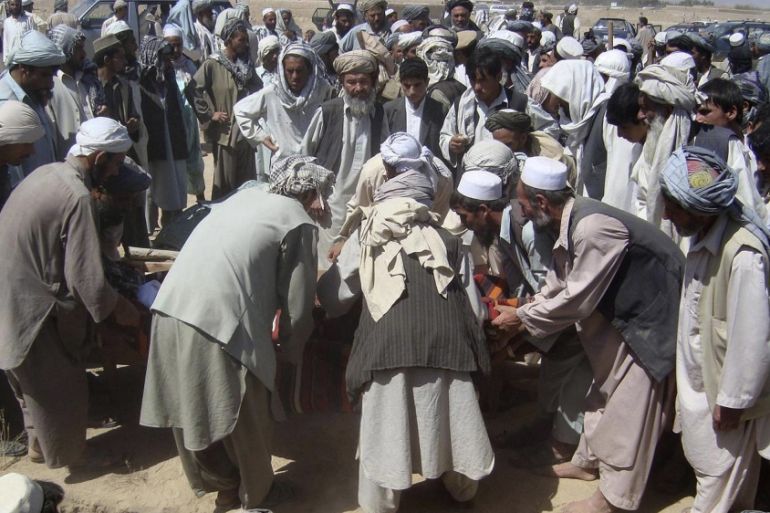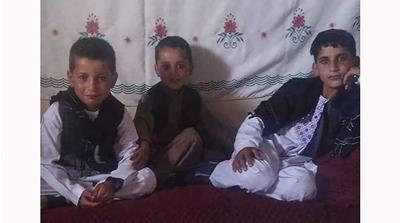Afghans demand justice amid attempt to probe war crimes at ICC
Man who lost wife and seven children in US air strike among many victims of violence who are seeking answers.

Masih Ur-Rahman’s seven children and wife were killed in a US air strike on their house last September in Wardak, a central Afghan province.
Four other relatives in the house, all children, also died.
Keep reading
list of 4 itemsRussia-Ukraine war: List of key events, day 809
Russia’s Putin to remove Sergei Shoigu as defence minister
At least 13 killed in Belgorod building collapse, Russia says
“I lost everything in this life,” he told Al Jazeera. “I ask myself every day, how could I have been strong enough to bury my children and wife, whose bodies were deformed and bloody? How did I not die of pain?”

His four daughters aged 14, 12, seven and five, and three sons – 10, eight and four, were all at home as he worked over the border in Iran, trying to eke out a better income to support them.
Now, Masih and other victims of relentless violence in Afghanistan are pinning their hopes on international courts to bring them justice.
Starting from Wednesday, prosecutors are appealing to judges at the International Criminal Court (ICC) who earlier rejected Gambian lawyer Fatou Bensouda’s request to open an investigation into alleged war crimes committed in Afghanistan.
The court rejected her request in April saying an investigation and prosecution were likely to fail because those targeted – including the United States, Afghan government and the Taliban – were not expected to cooperate.
Bensouda brings her case back on Wednesday to open a formal inquiry before a panel of appeals judges at The Hague.
The day of the ‘horrific’ airstrike
Before the air strike, Masih’s wife Amina called him and said soldiers had raided their house. That was the last time he spoke to her.
After a day without contact, Masih called his brother who delivered the unbearable news.
“All are gone, the air strike killed everyone. No one survived, have patience and faith in God,” his sibling told him.
Masih has been seeking justice since then.
He said Afghan government officials told him, “We have no control over this,” as they offered condolences.
The US-led military mission in Afghanistan initially denied the bombing on Masih’s house or any air strike that took place in the area.
But following an investigation by The Bureau of Investigative Journalism three months later, it confirmed the strike, but added that only fighters were killed.
“The open lies of the Americans and their atrocities in Afghanistan every day has left us with a hole in our hearts, we’ve lost everything,” Masih said.
“They have killed innocent people without accountability, I am pinning my hopes on the ICC’s hearings after being denied justice by the Americans and Afghan government officials.”
US President Donald Trump has denounced the ICC for its “broad, unaccountable, prosecutorial powers”, and Washington revoked travel visas for ICC personnel in response to the appeal on the investigation into war crimes in Afghanistan.
On Wednesday, Trump’s personal lawyer Jay Sekulow said in a statement ahead of the hearing that he intends to block Bensouda, the chief prosecutor, in her efforts to open the investigation, to defend the interests of US military members.
‘Bodies were on fire all night’
On December 1, a US drone struck a car, setting it on fire in southeastern Afghanistan, killing all five people inside.
The bodies of 25-year-old Malana, who had just given birth, her father-in-law, mother-in-law, sister-in-law and the driver, were “burnt to ashes”.
Gulu, Malana’s father, now looks after his grandchildren, including the newborn.
“Since their mother is gone, these two children have been crying every single day, longing for their mother. Nothing can console them,” Gulu told Al Jazeera.
Gulu said his daughter had health complications after giving birth and was rushed to a local hospital.
“On the way back from the clinic, the drone set the vehicle on fire,” he said.
“I don’t know what their mistake was and why a drone targeted them. They were carrying a patient.”
A local tribal leader, Gul Mer Jan, said the car was on fire for hours, leaving the community with just “pieces of bodies” to bury.

“Their bodies were fully burnt,” he said. “Americans have modern technology, why can’t they separate civilians from militants?
“I want the ICC to do investigations regarding civilian casualties in Afghanistan and especially regarding those events in which the victims are women and children.”
The United States military command in Afghanistan confirmed a strike in Khost to the New York Times, saying that three Taliban fighters were killed. However, they said the strike took place on Thursday, November 28.
“We are aware of the allegations of civilian casualties and working with local authorities to determine the veracity of these claims,” Colonel Sonny Leggett, a military spokesman, told the newspaper.
Back in Wardak, Masih says the ICC could be the “last resort” for crimes committed in Afghanistan’s 18-year war, in which the Taliban, which was removed from power by US-led forces in 2001, had been fighting against the country’s Western-backed government as they demanded the withdrawal of foreign troops.
The conflict claimed the lives of a record number of people in the third quarter of 2019, according to United Nations, with 1,174 civilians killed and 3,139 others wounded.
Some 41 percent of the casualties were women and children.
The UN reports that “anti-government elements” were responsible for more casualties for the first time this year, compared with US and pro-government forces.
The ICC has jurisdiction over war crimes, genocide and crimes against humanity if they have been committed by countries of a signatory state, or if they took place on one of its 123 members, which includes Afghanistan.
“I don’t think my children even knew what was happening when the air strike hit them,” said Masih. “They were innocent. I have the right to ask why were they killed, but no one listens, so what do you do?”